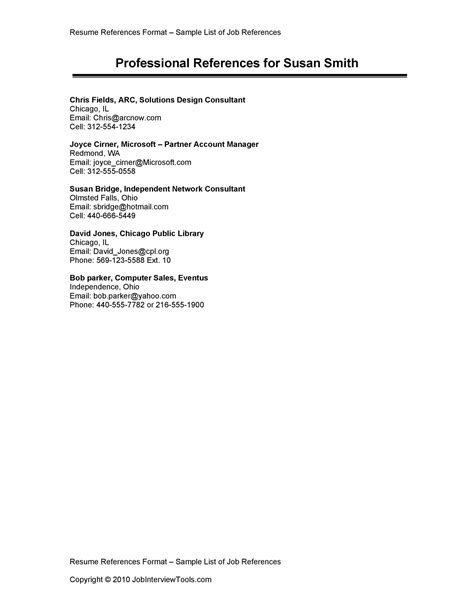Formatting Professional References: A Complete Guide

Professional references are an essential component of job searching. They provide potential employers with an insight into your work ethic, achievements, and character. However, presenting your references in the right format is just as important as choosing the right people. In this guide, we’ll cover everything you need to know about formatting professional references, from selecting the right references to presenting them in the right way.
Choosing Your References
Before you start formatting your references, you need to choose the right people to recommend you. Here are some factors to consider:
- Relevance: Choose references who have worked with you in the same or a similar industry, or who have experience in the same field as the job you’re applying for.
- Professionalism: Select references who are reliable, responsible, and have a good reputation in the industry.
- Availability: Make sure your references are available and willing to provide a reference for you at short notice.
- Diversity: Choose references from different areas of your professional life, such as a former boss, a colleague, and a client.
Asking Your References
Once you’ve decided on your references, it’s time to ask them for permission. Here’s how:
- Contact your potential references and ask if they are willing to provide a reference for you.
- Explain the job you’re applying for and provide some context about the company and position.
- Ask if they are comfortable providing a reference, and if they say yes, ask for their preferred contact information.
- Thank them for their time and offer to keep them updated on your job search.
Formatting Your References
Now that you have your references’ permission, it’s time to format them correctly. Here’s what to include:
- Name: List your reference’s full name.
- Job Title: Include your reference’s job title and company name.
- Contact Information: Provide your reference’s email address and phone number.
- Relationship: Explain your relationship to your reference, such as former boss or colleague.
- How Long You Worked Together: Include the length of time you worked with your reference.
Here’s an example of how to format your references:
| Name | Job Title | Contact Information | Relationship | How Long You Worked Together |
|---|---|---|---|---|
| John Smith | VP of Sales, XYZ Company | john.smith@xyzcompany.com 555-555-5555 |
Former Manager | 3 years |
| Jane Doe | Director of Marketing, ABC Inc. | jane.doe@abcinc.com 555-555-5555 |
Former Colleague | 2 years |
Presenting Your References
When presenting your references, you have a few options:
- Include them on your resume: You can include your references on your resume, either at the bottom or on a separate page.
- Create a separate reference sheet: You can create a separate document that lists your references and provide it to potential employers upon request.
- Provide them upon request: You can wait until a potential employer asks for your references and provide them at that time.
Conclusion
Formatting your professional references correctly is an important part of job searching. By choosing the right references, asking for permission, and presenting them in the right format, you can increase your chances of landing your dream job. Good luck!
FAQs
What if I don’t have any professional references?
If you don’t have any professional references, consider asking a former professor, coach, or volunteer supervisor. You can also include personal references, such as a family friend or mentor, but make sure they are aware of your professional skills and accomplishments.
How many references should I provide?
Typically, you should provide three to five references. Make sure to choose references who can speak to your work experience, skills, and character.
What if a potential employer asks for a specific type of reference?
If a potential employer asks for a specific type of reference, such as a former manager, try to provide a reference that fits that description. If you don’t have a reference that fits the criteria, explain why and provide a different reference that can speak to your skills and experience.
Should I provide my references’ full contact information?
Yes, you should provide your references’ full contact information, including their email address and phone number. Make sure to ask your references for their preferred contact information before providing it to potential employers.
Can I use references from a previous job if I was fired?
Yes, you can still use references from a previous job even if you were fired. However, make sure to choose references who can speak positively about your work experience and skills, and explain the circumstances surrounding your termination if asked.

